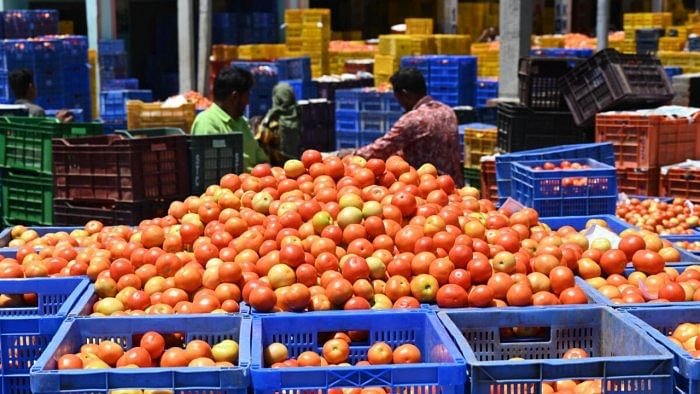
The reason for the sudden rise in tomato prices across the country lies in Bengaluru’s backyard.
The arrivals at the Kolar Agricultural Produce Market Committee (APMC), which is a major supplier of tomatoes to the entire country from June to September, have seen a sharp decline. The APMC has received only 3.2 lakh quintals of tomatoes this June, as against 5.45 lakh quintals in June 2022. In fact, the arrivals are on a downward trajectory since 2021 when they had touched 9.37 lakh quintals in June.
Farmers attribute the fall in yield to tomato leaf curl virus disease, which has hit the crop in Kolar and neighbouring tomato-growing districts. “We generally have 15 rounds of harvest this season. However, this time, we will get only 3-5 rounds as the plants are drying up due to the disease,” says farmer Nalini Gowda.
She was expecting 9,000 boxes (15 kg in each box) of harvest from her three-acre field. Now, she has to settle for 1,800 boxes. The fruit sets after 70 days of planting the sapling; the harvest period is 45 days.
A field visit-based report by ICAR-IIHR scientists confirms that tomato leaf curl virus has affected more than 50 per cent of the crop in Kolar’s villages.
The quality of the fruit is also a major concern as the APMC can supply to faraway places like Delhi only if the fruit stays firm for 72 hours. The current batch loses its stiffness after 52 hours.
“We are not getting quality fruits that meet three important parameters — size, colour and firmness. Previously, we used to supply 2.5-3 lakh boxes every day in June,” says Vijayalakshmi N, secretary, Kolar APMC. On June 29, the APMC supplied only 29 truckloads (68,912 boxes) of tomatoes to 10 states. It also supplies to Bangladesh and Sri Lanka.
The situation might worsen as standing crops are dwindling and the new crop takes 70-100 days to harvest. No other region in India grows tomatoes in large areas in this season due to adverse agro-climatic conditions, she says.
“While the price per box in June is between Rs 300 and Rs 1,250 for tomatoes, this year it ranges from Rs 350-Rs 1,500,” says Vijayalakshmi. On Sunday, it touched Rs 1,700.
Even though farmers are getting good returns for harvested tomatoes, they are not able to get back the money invested in the crop. The cost of tomato cultivation is around Rs 2.5 lakh per acre. This year, it has slightly gone up as instead of once a week, the farmers are spraying chemical pesticides and insecticides twice a week.
Also Read: Lessons in the rise of tomato prices
“The cost per spray has also doubled to Rs 15,000 to contain the disease,” says farmer leader Abbani Shivappa.
“The water from the KC Valley project seems to have increased the incidence of pests and diseases in tomato fields in Kolar. Also, the horticulture department should be proactive in addressing the problems of farmers. The leaf curl disease was seen six months ago; had the department found a solution we wouldn’t have to suffer this plight,” says Shivappa.
Last year, the growers did not get good yield due to the discolouration of the fruit owing to heavy rainfall, but this year, the disease has affected almost all regions of Kolar and Chikkaballapur, and across varieties, resulting in 50 per cent crop loss, says Kumaraswamy SR, Deputy Director of Horticulture, Kolar.
“High temperature and sparse rains have resulted in the widespread multiplication of white fly, which transmits leaf curl disease. June to August is the peak season in Kolar and this disease has hit farmers and consumers alike. We are encouraging farmers to diversify crops,” he says.